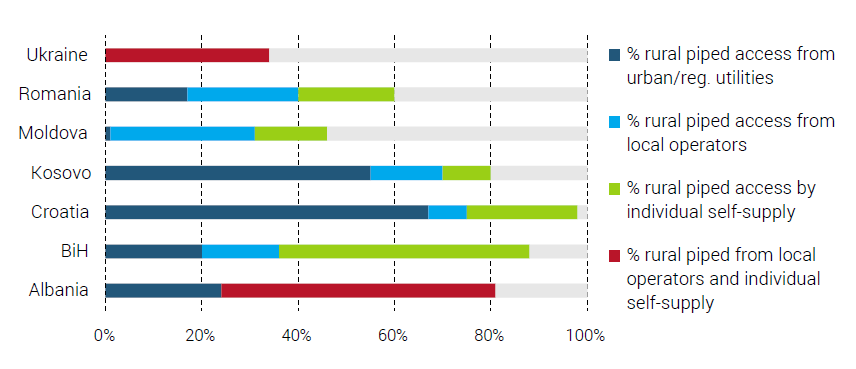Beyond Utility Reach
Given that significant access gaps are a major barrier to fulfilling the Sustainable Development Goals, this study called "Beyond Utility Reach? How to Close the Urban - Rural Access Gap - A Review of Rural Water and Sanitation Services in Seven Countries of the Danube Region” was launched to increase awareness and knowledge on how rural service provision is organized, to understand whether and how the aggregation through regional water utilities has effectively reached rural areas, and to present lessons and recommendations for expanding and improving the provision of services for rural populations.
Seven countries—Albania, Bosnia and Herzegovina, Croatia, Kosovo, Moldova, Romania, and Ukraine—were selected, because they represent a wide range of rural water outcomes, different challenges, and sector reform contexts. The analysis was based on secondary data sources, documents, and existing datasets, combined with primary data collection in selected rural localities in the seven countries. Over 4,100 connected households and over 1,200 self-supply households were interviewed, 178 interviews were conducted with service providers, and 162 interviews were conducted with members of local governments.

 A few of the main recommendations that the report highlights as a path towards achieving the SDGs are presented below:
A few of the main recommendations that the report highlights as a path towards achieving the SDGs are presented below:
- Most countries will need a portfolio approach that adopts different service delivery models for reaching different rural population groups. The enabling policies, legislative framework, and financing measures need to recognize the different service delivery models required to address all rural water supply needs.
- Countries are encouraged to implement targeted social support initiatives to address connection barriers for poor and disadvantaged populations, potentially also for self-supply support.
- Expanding access should be an explicit objective of regionalization of utilities with time-bound accountability and strong incentives.
- Support functions and capacity building programs for local operators and local governments should be institutionalized and funded to ensure sustainability.
- To reach universal access, a supported self-supply model will need to be a part of the solution as is the case in many Western countries with dispersed rural populations.
- Rural sanitation strategies need to be developed based on guiding criteria to adopt appropriate individual systems as opposed to only sewerage solutions for agglomerations with a population below 10,000 people.